
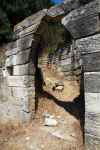
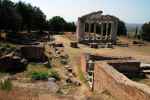
Apollonia was founded in 588 B.C. jointly by the Greek settlers from Corinth and Kerkyra (today Corfu), N.B. colonised by Corinthians in about 8th century B.C.1 The settlers were led by a man called Gylax and it was his name after which the city was given its first name – Gylakeia. Later, the name was changed to honour the god Apollo. Thirty other cities in Macedonia, Thrace, Crete or Italia honoured the god in the similar way2. For a change, we also have Aπολλωνία κατ' Επίδαμνον, i.e. Apollonia near Epidamnos – the city which was founded a bit earlier, in 627 B.C., also by the settlers from Corinth and Kerkyra. Apollonia, which this article refers to, was founded in the land that ancient people called Illyria. These days, the ruins of the city lie in Albania, close to Pojani village, 7 km from Fier.
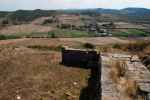
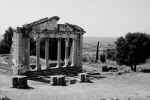

The settlers founded the city in a very convenient location. Apollonia was built on a gentle hill over the Aoos River (Αώος), just a few kilometres from the sea. When it comes to the trade, the new Corinthian colony was perfectly located and, what is more, it was situated on very fertile soil, so it is not surprising that soon it became one of the richest harbours of the Adriatic Sea.
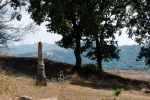
At the turn of the 4th and 3rd century B.C., the city was flourishing; ramparts were rebuilt and a new coin was being issued. In 282 B.C. Apollonia was seized by the king of Epirus – Pyrrhus. After his death, the city strengthened its relationships with Rome which stationed its permanent garrison here since 229 B.C. Nevertheless, in 210 B.C., the Macedonians defeated defence and plundered the city. Roman army stayed in the city until 168 B.C. when it crushed the remaining significant military forces in this region: Illyrian state, the Kingdom of Macedonia and the Epirots. Through the strong alliance with Rome, after winning the battles, Apollonia was rewarded with full autonomy!

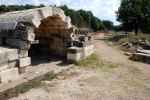
In 146 B.C. the Roman proconsul Gnaeus Egnatius began the construction of a road which inherited its name after its designer, i.e. Via Egnatia (Ἐγνατία Ὁδός). It led from Dyrrachium through Thessaloniki up to Bizancjum, 746 Roman miles3 in total, i.e. about 1103 km. Apollonia had become the second, after Dyrrachium, western end of this road, which had an impact on the city’s growing importance.



Regrettably, at the beginning of the 3rd century, Apollonia was largely destroyed by a strong earthquake. What is more, due to this earthquake, the bed of the Aoos River (now Vjosës) moved away from the city and the crop fields turned into marsh. The total destruction of the city was sealed by the invasions of people from the north. In the end, the city of Apollonia perished.
ATTENTION! Everyone who visited Albania or is planning to go there soon is kindly invited to contribute to this guide. Any inquires regarding this matter should be referred to the editor's address redakcja@libertas.pl.
Fier – not quite interesting, industrial city is located in the vicinity of Apollonia. You can reach the city by bus. From there, you can take a van which will take you to Pojani. Albanians are very obliging and a driver will surely cover half a kilometre more by taking you all the way to the ruins of the city (we paid 50L for each person whereas a taxi driver wanted 1000L and did not want to haggle). It can be worse on the way back; when we went back to Pojani it turned out that a siesta was taking place and the van driver was just taking a rest. Being a little disheartened, we stopped off in a small barroom to have the Tirana beer which is necessary in such situations. The owner did not know English but he immediately grasped, however, what we needed (we made understood each other in sign language). [Incidentally, I learned a new Albanian word – autista which stands for a driver]. Barman called a neighbour who, after several minutes, came for us in his Mercedes! Smiling and talking about something in Albanian, he took us to a bus stop with a van already waiting for us. We hit the road right away! And now, a riddle: how is it that there are no timetables in Albania, most means of transport is private, not subsidized at all, and yet it all works fine; sometimes one has an impression that it works even more efficient than in Poland!
See: Kazimierz Kumaniecki, Historia kultury starożytnej Grecji i Rzymu, Warszawa 1965, s. 63-64.
See. Red. Zdzisław Piszczek, Mała Encyklopedia Kultury Antycznej, Warszawa 1966, s. 72.
One Roman mile (1478,5 m) equals to 1000 double paces (one step with each foot).
Na tematy związane z artykułem można porozmawiać na forum w wątku Albania.